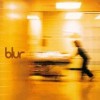Another transformation for Blur for the self-titled 1997 fifth album, gone was the cheekiness, the underhand scathing appeal of the last two records and in its place something darker, more agile and strong sounding took hold.
The road from Leisure to Think Tank is well documented, anyone who lived through the times and watched Blur could see a tension rising in the band and something the four men would not allude to publicly for many years. The rift between two friends of Graham Coxon and Damon Albarn was growing and the music’s direction gave a good example of where lines were now being drawn. Although the now temporary split was a couple of albums away, the material used for Blur was darker, more personal. Damon Albarn’s other significant relationship with his then girlfriend, Justine Frischmann, was also passing.
This is reflected in the album’s opening track and lead single Beetlebum. The song has the signature guitar distortions that the band used to use so cleverly but now they sounded more dirty, guttural and as if the notes had been picked up from the streets, given a hose down and expected to perform like normal. Damon Albarn sings of just wanting to slip away, an allusion to the band or to the dysfunctional surroundings all the members were beginning to feel and that would really take hold in 13 is something the ordinary fan will probably never know.
As a song writing exercise it showed Damon’s influences were changing, his outlook, perceived to be one of intelligent sarcasm and regard for ordinary humanity were at odds with the lyrics on Beetlebum. It suited the band, it suited Damon Albarn and most importantly it still suited the fans. Bizarrely though for the foursome, the band started to have the real breakthrough in America, a place they had derided with their music leanings over the previous albums. A greater sense of purpose perhaps or musical acknowledgement, either way it didn’t do the band harm…as such.
If Beetlebum was guttural, then the follow up track and second single release of Song 2 was vintage rock, boot kicking, in your face and loving every moment rock. The riffs were not just good they stormed and announced themselves in a way that the band had avoided and became one of the firm favourites when performed live. It’s fast and punchy, direct and easy to drag yourself up to the front of the stage and mosh to. For that alone it deserves its place in the pantheon of all time songs.
Never afraid to look backwards to gain inspiration, they ‘borrowed’ heavily from David Bowie’s Boys Keep Swinging for their own song of M.O.R. a cracking little track that somehow gets better every time you hear it.
The rest of the albums carry’s on in much a similar vein, experimental, pivotal in parts but never allowing itself to become dull and staid. It starts to languish on some tracks, such as Death of a Party but even those relatively few moments are easily glossed over as Blur managed to carry on the good work of the two previous albums.
The crash hadn’t appeared despite drummer Dave Rowntree telling the story in the sleeve notes that accompany the new 21st anniversary box-set editions of Graham Coxon admitting that he used to say, “he wanted to do an album that nobody would want to listen to.”
The fall out hadn’t completely started but the cracks had become apparent. Disaffection was evident and other avenues were starting to be explored. For all of that, Blur were still a force to behold, just because the tidal wave is slowing down, doesn’t make it any less dangerous to be caught in its swell.
Ian D. Hall

